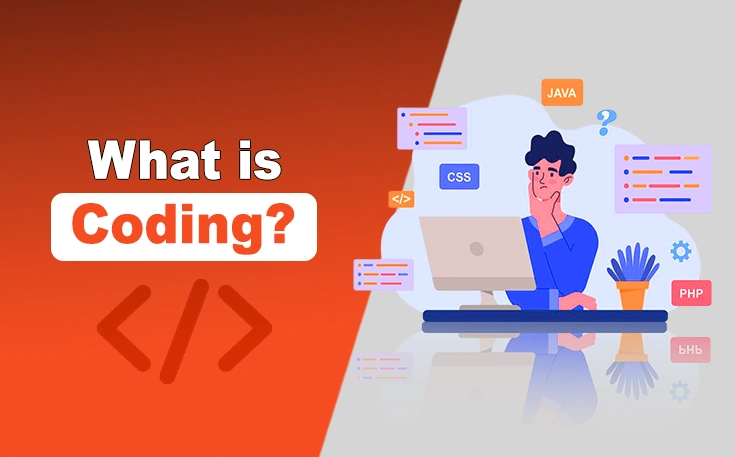Coding is one of the most important aspects of the digital world as it plays its role in developing software applications as well as websites. Moreover, it is the language that computers understand to carry out the development procedures.
In this digital age of web design, coding plays an essential role in enhancing the visual and interactive elements to make sure that you can engage the maximum audience possible. Still, some beginners are unaware of this technique.
In this blog post, we have explained what is coding along with its role in web design.
What is Coding?
Coding or programming is the process of generating instructions for computers to carry out specific tasks that could be impossible otherwise.
These languages, including the likes of HTML, CSS, JavaScript, and Python, play an important role in establishing the structure and delivering the essential syntax to communicate with computers effectively.
Coders also have to integrate their logical thinking and problem-solving skills to establish software, apps, websites, and others. Coding techniques are also necessary for developing sturdy technological solutions to a wide range of problems by automating repetitive tasks to build complex systems.
Role of Coding in Web Design
The role of coding in web design is very widespread. In the under-section, we have explained some of its key roles.

1. Structural Foundation
HTML is defined as the backbone of web pages as it provides a structure and foundation for the content and elements of your website.
Also, HTML determines the layout and headings along with paragraphs, images, links, and other essential components of a website. Coders are now using HTML to create a comprehensive attraction of the website that will organize the content logically and also help users engage with it.
2. Styling and Layout
CSS coding is important too alongside HTML as it will add style and design to your web pages. Designers can easily control the layout, colors, and different essential elements of your websites.
In addition, targeting specific HTML elements with the help of CSS coding can present the user with an aesthetic look of your website. Above all, it ensures consistency across different web pages, making it look more appealing.
3. Dynamic Interactivity with JavaScript
JavaScript is a dynamic language that not only brings interactivity but also functionality to website pages. It enables the developers to create responsive elements like forms, interactive maps, and other dynamic animations to make the web page more engaging.
Furthermore, JavaScript can influence the designer to engage users with more interactive elements that will enable them to perform the desired action. By leveraging this coding technique, you can generate beautiful pages that will help users update the desired section without reloading the complete site.
4. Responsive Design for Multi-Device Compatibility
In this widely competitive digital landscape, it is essential for owners to keep their websites responsive for multi-device compatibility. Therefore, coding plays an essential part in making your site functional. Coders can integrate flexible designs and themes to your site that will change its shape, structure, and positions of elements, depending upon the screen size.
Ultimately, the websites become more accessible and can be used across different devices, like laptops, PCs, mobiles, iPads, and others. Moreover, by creating a proper combination of HTML, CSS, and JavaScript techniques, you can optimize them for every device. It will help you capture a broader audience.
5. Performance Optimization for Speed and Efficiency
Website performance is also essential in this modern world because Google ranks sites that load faster. Coding is essential when it comes to lowering your site latency as it helps in the integration of lightweight elements.
The implementation of different coding techniques can make the content and other elements relatively smaller in size and also, enable the lazy loading of the images.
6. Cross-Browser Compatibility for Consistent Experiences
Numerous web browsers are available for usage on different devices. That’s why, it is essential for website owners to make their website compatible with all of them. Coding helps you ensure cross-browser compatibility by adding styles, markup, and other critical elements that can be managed on every device.
In this way, they can allow the maximum audience to reach your website and help you achieve the desired results. Besides, you can implement the CSS coding to eliminate the compatibility issue and ensure the consistency.
7. Accessibility Support for Inclusive Design
Accessibility is also essential and it is the most fundamental aspect of a web in the modern world because it determines how many individuals with disabilities can use the potential of your site. Coders must integrate accessibility features and offer the best practices to make the web content understandable for them.
By implementing the semantic HTML markup, they can add reboot for images and also enable keyboard navigation support to help individuals with disabilities reach the content. Above all, accessibility guarantees the flow of information equally to all persons.
8. Search Engine Optimization for Visibility and Discoverability
Search Engine Optimization is essential for improving the visibility of websites in search engine results pages. Coders can utilize the potential of SEO best practices, such as using semantic HTML markup and improving site speed and performance.
By designing web pages and writing relevant content, developers enhance the chances of websites ranking higher in search engine rankings. SEO-friendly web design is also helpful in attracting organic traffic and reaching the targeted audience effectively.
To Sum Up
Coding has a huge role in web design as it enables designers and developers to create unique and functional web pages that are easily accessible and highly engaging. By implementing HTML to structure the content, they can have additional advantages of creating stylish layouts with the help of CSS.
Furthermore, JavaScript can ensure the integration of interactive and dynamic features that will enhance the beauty of your site. By implementing the right combination of different coding techniques, you can have your hands on a diverse audience that will take your experience to an advanced level.





